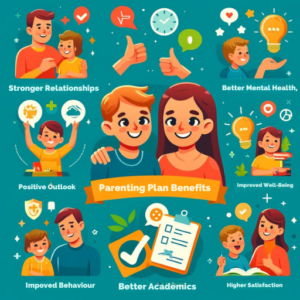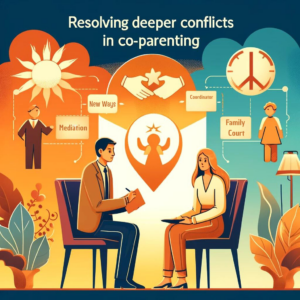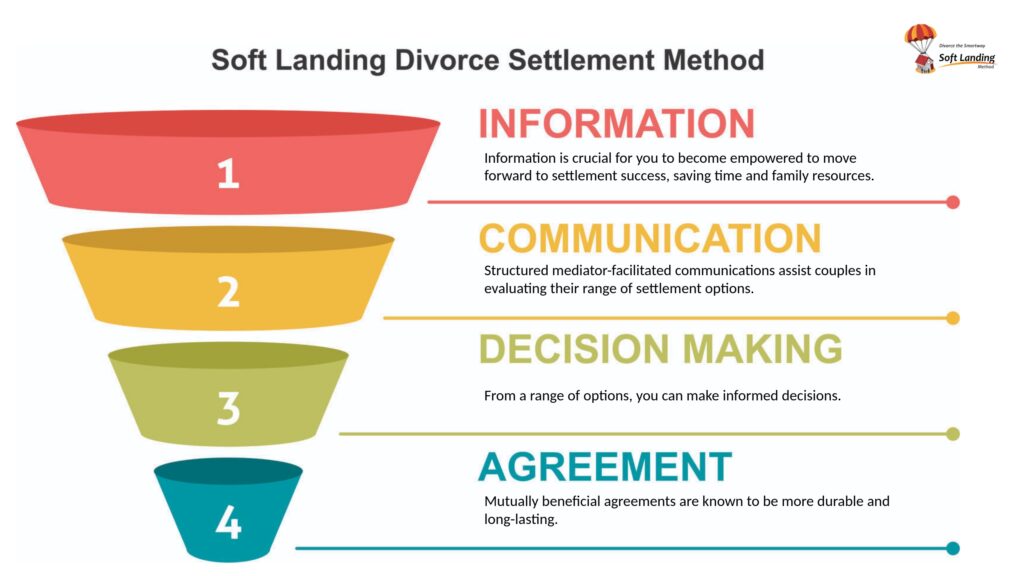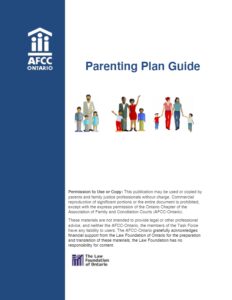Learning from Failures: Guide to a Successful Parenting Plan?

What is a Parenting Plan?
Top 10 Parenting Plan Checklist Items
Here are the key sections typically included in a parenting plan. Prepare yourself with a parenting plan checklist to ensure all aspects are covered comprehensively.
Supporting Your Child’s Relationship With Your Ex
Your child came from both you and your ex. This means that when you criticize your ex in front of your child, you’re criticizing your child. When you alienate your ex, you tell your child that half of him is unacceptable. While it might not be possible to be best friends with your ex, getting along is key, and you should never criticize your ex in front of your child.
How a Parenting Plan Benefits Parents
You might be tempted to duke it out in court with your ex for months or even years, but a parenting plan is a much wiser strategy that protects everyone’s well-being. Indeed, a parenting plan may be the best gift you can give yourself.

How a Parenting Plan Benefits Children
When you make financial, “custody” and other divorce decisions, the well-being of your children should be the first thing on your mind. More than half of children whose parents get embroiled in “custody” battles develop depression, but a parenting plan can save them from this misery. Your child can rest easy, with complete security that she’ll have substantive time with both parents.

Common Parenting Plan Questions:
Resources for creating a parenting plan in Ontario can be found online through legal websites, government resources, and family law professionals. Consulting with a Divorce Mediator or Certified Divorce Financial Analyst can provide personalized guidance and access to templates and checklists.
The key components of a parenting agreement template include decision-making responsibilities, a parenting time schedule, provisions for the child’s care, education, and religious instruction, and guidelines for communication and dispute resolution. It should also outline the process for modifying the plan.
Yes, a parenting plan can be legally binding in Canada if it is incorporated into a court order or a separation agreement. It is advisable to work with a legal professional to ensure that the parenting plan meets all legal requirements and is enforceable.
A parenting plan can benefit children during separation by providing a stable and predictable environment. It ensures that both parents are clear about their roles and responsibilities, reducing the child’s exposure to conflict. The plan serves the child’s physical and emotional needs, promoting their overall well-being.
Creating an effective parenting plan involves several steps:
1) Identify key areas like decision-making responsibility and parenting time schedules;
2) Discuss and agree on these areas with the other parent;
3) Draft the plan in writing;
4) Review the plan with a legal professional or mediator;
5) Implement and follow the plan, making adjustments as needed.
A parenting plan is essential in Ontario to ensure that both parents have a clear understanding of their responsibilities and the child’s needs are met consistently. It helps prevent conflicts and provides a structured approach to co-parenting, which is beneficial for the child’s well-being.
A parenting plan should include decision-making responsibilities, a parenting time schedule, provisions for the child’s care, education, and religious instruction, and guidelines for resolving disputes. It should also address how changes to the plan will be managed and include a parenting plan checklist to ensure all important areas are covered.
Yes, you can find sample parenting plan templates for Canada through legal resources online or by consulting with professionals like a Divorce Mediator or Certified Divorce Financial Analyst. These templates often include sections on decision-making responsibility, parenting time schedules, and guidelines for communication and dispute resolution.
To create a parenting plan template in Ontario, start by identifying key areas such as decision-making responsibility, parenting time schedules, and provisions for the child’s care, education, and religious instruction. You can use resources like sample templates available online or consult with a Divorce Mediator or Certified Divorce Financial Analyst for guidance.
A parenting plan is a written agreement that outlines how parents will raise their children after separation or divorce. It covers decision-making responsibilities, parenting time schedules, and how to handle disagreements. A parenting plan is important because it provides clarity, reduces conflict, and ensures that the child’s physical and emotional needs are met.
Resolving Deeper Conflicts: Present and Future
Even parents with the best intentions occasionally can’t resolve a parenting issue. But it’s unfair to your children when you and your ex are perpetually fighting about the same thing. You have a few different options when one parent violates the agreement, when you can’t agree about what to put in the parenting plan, or when you want to change the plan but your ex doesn’t.

Step-by-Step Guide for Creating a Parenting Plan
External links that may interest you
- Create a Parenting Plan – A parenting plan is a written document that outlines how parents will raise their children after separation or divorce.
- Parenting Plan Guide and Template – This guide combines research on the impact of parental separation and divorce on children with practical insights.
- Parenting Plan Tool Instructions – Instructions for creating a parenting plan, detailing how parents will raise their children post-separation or divorce.
- Parenting time, decision-making responsibility and contact – Outlines when each parent will spend time with the children and who will make major decisions about the child.
- Parenting Plans (Custody Agreements) in Ontario, Canada – Guidelines for creating a parenting plan to avoid court or as evidence at trial.
- Parenting Plan Guide – Guide combining developmental research and practical insights on the impact of parental separation.
- Parenting Plan Guide – Another detailed guide from AFCC on the impact of parental separation and practical insights.
- How are parenting plans decided? – CLEO (Community Legal… – Explanation of how parenting plans are decided, including the use of alternative dispute resolution methods.
- Ontario parenting time arrangements & schedules – Examples of different custody and visitation schedules like the 1st, 3rd, and 5th weekends schedule.
- Sample Parenting Plan – Ottawa Divorce Lawyers – Sample parenting plan that acknowledges the evolving needs of children and parents.
- Decision-making responsibility (formerly custody) – Overview of decision-making responsibilities and parenting time arrangements.
- Parenting Plan Template – Template prepared by the Ontario Chapter of the Association of Family and Conciliation Courts.
- Agree on the terms of your parenting plan – Information on creating a parenting plan as part of a separation agreement.
Ken Maynard CDFA, Acc.FM
I assist intelligent and successful couples in crafting rapid, custom separation agreements that pave the way for a smooth transition towards a secure future. This efficient process is achieved in about four meetings, effectively sidestepping the excessive conflicts, confusion, and costs commonly linked to legal proceedings. Clients have the flexibility to collaborate with me either via video conference or in-person through a DTSW associate at any of our six Greater Toronto mediation centers, located in Aurora, Barrie, North York, Vaughan, Mississauga, and Scarborough.
Have a few questions - Tap here to Schedule a Get Acquainted Call




















































